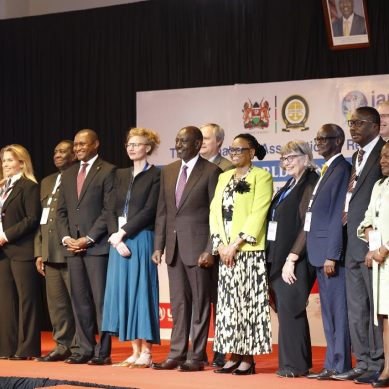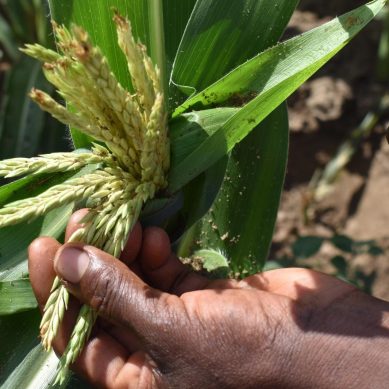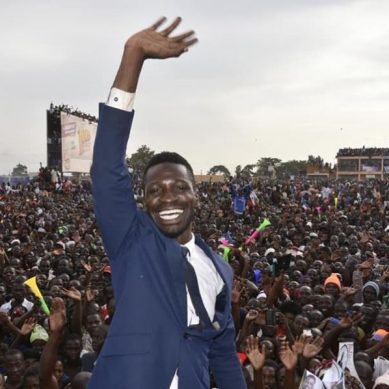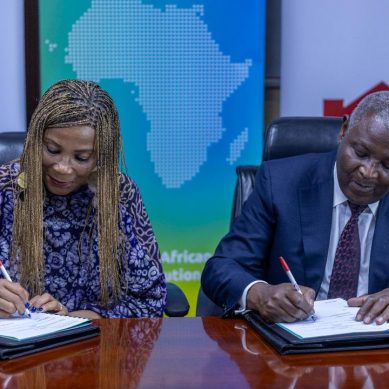
Democratisation is the structural government transition from an authoritarian government to one installed in power by popular vote, including substantive political changes moving in a direction predetermined and agreed upon by masses.
Democratisation, however, is not just political process. It includes other dimensions, namely: social democratisation, economic democratisation, cultural democratisation, environmental democratisation, ecological democratisation, academic democratisation, intellectual democratisation, educational democratisation, agricultural democratisation, scientific democratisation and spiritual democratisation.
De-democratisation is the reverse of democratisation. A government in power, which may have been committed to democratisation begins to manifest as authoritarian and to undertake political changes that counteract democracy. These may include proscribing political parties and making society less pluralistic in favour of monolithism.
In Uganda de-democratisation is proceeding simultaneously with inequality-building and popularisation of the lie that a politicomilitary order can allow for democratisation politically through periodic elections. Yet the elections really belong to the one who organises them -not to lose them but to win them at all costs.
Given these socio-political conditions, Uganda under Movement rule and authoritarian populism is experiencing democratic failure, democratic subversion, democratic resistance and democratic polarisation by the powers that be, hence a crisis of democracy.
Promoting and protecting democracy in Uganda in times of authoritarian populism and de-democratisation is thus becoming a nightmare for the alternative political forces struggling to re-democratize the country. The democratic challenge is real. It demands rethinking governance altogether towards re-democratisation in Uganda before it is too late. The rethinking and re-democratisation must consider the role of pro-regime pastors and clergy in the de-democratisation processes, not only in the spiritual. but also, in the other dimensions of democracy.
In this article I propose that there are pastors and clergy that are integral to the process of de-democratisation of or in Uganda and who are, therefore, an antithesis of democracy and democratisation . They use their privileged positions as “servants” of God and the pulpit to sway their “spiritual” victims towards an increasingly authoritarian government and autocratic presidency central to which are the vices of presidentialism and fear.
Presidentialism is a vice because the holder of the title of president is in everything small and big and exudes fear personally and officially, and is also fearful of everything, including the people he rules. He takes the people as enemy number one of the state but uses authoritarian populism to create the impression that is for them while doing everything within his power to undermine the various types of democracy and democratisation in all dimensions to enhance his personal power, influence and wealth. He frequently presides over the making of policies and laws that disempowers and impoverish the people and weaken state institutions.
Presidentialism facilitates the presidency’s preying on and weakening of the Parliament of Uganda, judiciary and all other institutions of state, over which he has enormous influence and power by virtue of the Uganda Constitution 1995 and his personal manipulations, even by remote sensing. While he fondly regularly submits that Uganda is democratic, even when he knows it is impossible to have meaningful and effective democracy under a politicomilitary order, which he prefers, he has emerged as enemy number one of democracy and democratisation in the country.
Fear is a form of social control par excellence. Punitive power exploits people’s fear of social exclusion and the possibility of being labelled as a criminal to subject them to its control. In order to keep these threats alive, the punitive system enshrines penalties that have evolved over time and whose main paradigm today is the prison. In order to justify punishment and the control it entails, the punitive system uses fear of crime, of the criminal, of what is different, to incite permanent social alarm. In brief, fear as a core part of domination is an essential element of the punitive system.
Fear in Uganda is inbuilt in iron fist policies and law of the state. For example, when the president of Uganda wanted to create fear among the alternative leaders and/or political organisations, he used the Parliament of Uganda to enact the fear packed laws, including: Uganda Constitution 1995, which vests all power and authority in the hands of one man and raises him above the law; Movement Act 1997, which more or less creates a one-party state and coerces everyone to be in the Movement; Political Organisations Law 1997, which allows existence of political parties, controls their growth and development and denies them free political space to operate, organise and recruit new members; sectarian law, which allows foreigners the leeway to do anything they want without fear of reprisals from the indigenous people and actually silences the latter even when in extreme pain; and Anti-Terrorism Law 2002, which more or less decrees against political radicalism, demonstrations as political radicals and demonstrators can easily be baptised terrorists and thrown behind bars.
What is the role of pro-regime pastors and clergy in all this? Pro-regime pastors and clergy practice what is called religiopolitics and are, therefore religio-political in their spiritual work in favour of the powers that be. I have in the past written about the religiopolitics of Pastor Bugingo (Oweyegha-Afunaduula, 2023) and the religiopolitics of Nasbbi Daudi Isinga (Oweyegha-Afunaduula, 2024) of the Universal Apostles Fellowship Church of Righteousness. Both Aloysius Bugingo and Daudi Isinga are influential pastors and outspoken supporters of President Yoweri Tibuhaburwa Museveni and his National Resistance Movement (NRM), which today seems to be resisting democracy and democratisation of Uganda in favour of hereditary politics.
While a pro-regime theologian appeared on national television in Cuba denying the miracles of Jesus (Evangelical Focus, 2020) the religiopoliticians of Uganda do not deny Jesus and put him high above anything else (Oweyegha-Afunaduula, 2020), but they divinise President Tibuhaburwa Museveni almost to the point of advising their sheep to worship him. They even advise them to choose President Tibuhaburwa Museveni over and above other potential leaders of Uganda. They do not put themselves apart the Movement. Their churches are the preferred destinations of Movement leaders to seek God’s approval. Just like the pro-regime preachers in Egypt who frequently urge their audiences to be loyal to the State, the religiopolitical preachers of Uganda do the same and urge their spiritual followers to choose the Movement and President Tibuhaburwa Museveni.
Paul A Djupe and Christopher P. Gilbert (2008) wrote a beautiful article “The Political Influence of Churches”, which was published on Researchgate. They investigated the political influence of church and how membership in organized religious bodies shapes the political life of members. Djupe and Gilbert’s goal in this inquiry was to re-center scholarly attention on the voluntary association as an essential element of civic and political life. They developed a theoretical framework that captures the multifaceted elements of church life that affect individual political attitudes and actions. Political information from clergy, small groups, and social networks flows plentifully in churches, but individuals process that information differently depending on their motivations related to their status in the church.
Articulating a more fully specified model of how associations expose individuals to political information and norms will help us understand the political opinions and behavior of citizens and the contribution of that pattern to sustaining democracy (Paul A Djupe and Christopher P. Gilbert, 2008) Otherwise, democracy is in serious trouble not only in Uganda but in the whole world.
There is widespread belief among Ugandans that most Pentecostal churches in Uganda are pro-regime apologists and often urge their members to support the Movement and its chairman, who is also the President of Uganda, Tibuhaburwa Museveni. Researchers need to investigate how President Museveni and the Movement are reciprocating or paying back for the political support the Pentecostal churches are mobilising for them. However, if President Museveni and the Movement have strategised together to resist the proliferation and entrenchment of democracy and democratisation in Uganda, then the Pentecostal churches are, by extension, integral to the resistance of democracy and democratisation by President Tibuhaburwa Museveni and the Movement Regime.
For God and my country.
Tell report / By Oweyegha-Afunaduula / Environmental Historian and Conservationist Centre for Critical Thinking and Alternative Analysis (CCTAA), Seeta, Mukono, Uganda.
About the Centre for Critical Thinking and Alternative Analysis (CCTAA)
The CCTAA was innovated by Hyuha Mukwanason, Oweyegha-Afunaduula and Mahir Balunywa in 2019 to the rising decline in the capacity of graduates in Uganda and beyond to engage in critical thinking and reason coherently besides excellence in academics and academic production. The three scholars were convinced that after academic achievement the world outside the ivory tower needed graduates that can think critically and reason coherently towards making society and the environment better for human gratification. They reasoned between themselves and reached the conclusion that disciplinary education did not only narrow the thinking and reasoning of those exposed to it but restricted the opportunity to excel in critical thinking and reasoning, which are the ultimate aim of education. They were dismayed by the truism that the products of disciplinary education find it difficult to tick outside the boundaries of their disciplines; that when they provide solutions to problems that do not recognise the artificial boundaries between knowledges, their solutions become the new problems. They decided that the answer was a new and different medium of learning and innovating, which they characterised as “The Centre for Critical Thinking and Alternative Analysis” (CCTAA)
Further reading
Alikhani, B. (2017). Post-Democracy or Processes of De-Democratisation ? United States Case Study. Historical Social Research, 42(4), 189-206. https://doi.org/10.12759/hsr.42.2017.4.189-206
CEU Democracy Institute (). De- and Re-Democratisation (DRD). https://democracyinstitute.ceu.edu/research/de-and-re-democratisation -drd, https://d-nb.info/1198936282/34 Visited on 15 November 2024 at 9.01am EAT
David Paternotte, Mieke Verloo, De-democratisation and the Politics of Knowledge: Unpacking the Cultural Marxism Narrative, Social Politics: International Studies in Gender, State & Society, Volume 28, Issue 3, Fall 2021, Pages 556–578, https://doi.org/10.1093/sp/jxab025
Dena Freeman (2017). De-democratisation and Rising Inequality: The Underlying Cause of A Worrying Trend. Department of Anthropology and International Inequalities Institute, LSE Working paper 12 May 2017 https://eprints.lse.ac.uk/101847/1/Freeman_de_democrisation_and_rising_inequality_wp12.pdf Visited on 15 November 2024 at 8.58am EAT
Evangelical Focus (2020). Cuban Evangelical Churches Use the IbelieveInTheBible hashtag. Evangelical Focus, 22 September 2020. https://evangelicalfocus.com/world/8132/IBelieveInTheBible-becomes-a-trend-in-Cuba Visited on 15 November 2024 at 1.51pm EAT
Fleury, S. et al. (2023). Authoritarian Populism, De-democratisation , and Social Policy Dismantling: Lessons from Brazil. In: Fleury, S. (eds) Social Policy Dismantling and De-democratisation in Brazil. Societies and Political Orders in Transition. Springer, Cham. https://doi.org/10.1007/978-3-031-35110-5_9, https://link.springer.com/chapter/10.1007/978-3-031-35110-5_9#citeas Visited on 15 November 2024 at 9.20am EAT.
Jorge Nef and Bernd Reiter (?). The democratic Challenge: Democratisation and De-democratisation in Global Perspective. Digital Commons, University of Florida. https://digitalcommons.usf.edu/ Visited on 15 November 2024 at 9.34am EAT
Juan J. Linz (1990). The Perils of Presidentialism. Journal of Democracy, Volume 1, Number 1, Winter 1990,pp. 51-69.
Oweyegha-Afunaduula (2022). Perils of Presidentialism in Uganda. Daily Monitor 5 March 2022. https://www.monitor.co.ug/uganda/oped/commentary/perils-of-presidentialism-in-uganda-3737584 Visited on 15 November 2024 at 8.15am EAT.
Oweyegha-Afunaduula (2022). From Hereditary Chiefs and Hereditary Kings to Hereditary Politicians. Ultimate News, April 19 2022, https://ultimatenews.co.ug/2022/04/uganda-from-hereditary-chiefs-and-kings-to-hereditary-politicians/ Visited on 15 November 2024 at 12.37pm EAT.
Oweyegha-Afunaduula (2024). The Religiopolitics of the Universal Apostles Fellowship Church of Righteousness (Of Nabbi Daudi Isinga). Ultimate News, September 17 2024. https://ultimatenews.co.ug/2024/09/oweyegha-afunaduula-the-religiopolitics-of-the-universal-apostles-fellowship-church-of-righteousness-of-nabbi-daudi-isinga/ Visited on 15 November 2024 at 12.39pm EAT.
Oweyegha-Afunaduula (2024). Religion, Politics and Polarisation in Uganda: The Religiopolitics of Pastor Bugingo. East African Watch, January 7 2024. https://eastafricanwatch.net/religion-politics-and-polarization-in-uganda-the-religiopolitics-of-pastor-bugigo/ Visited on 15 November 2024 at 12.24pm EAT.
Paul A Djupe and Christopher P. Gilbert (2008). The Political Influence of Churches. Researchgate, January 2008. DOI: 10.1017/CB09780511819117 https://www.researchgate.net/publication/289101755_The_political_influence_of_churchesVisited on 15 November 2024 at 13.14pm EAT
Paz Francés Lecumberri (?). Fear Management as a Political Instrument. https://www.icip.cat/perlapau/en/article/fear-management-as-a-political-instrument/ Visited on 15 November 2024 at 8.22am EAT
Rosembuj, Tulio, Tilly, Tax Democratisation , De-democratisation , Re-democratisation (April 7, 2023). Available at SSRN: https://ssrn.com/abstract=4443319 or http://dx.doi.org/10.2139/ssrn.4443319, https://papers.ssrn.com/sol3/papers.cfm?abstract_id=4443319 Visited on 15 November 2024 at 9.11am EAT.
Tilly, C. (2003). Inequality, democratisation and De-democratisation . Sociological Theory, Vol, pp. 37-43 (7 pages) Published By: American Sociological Association.
Tilly, Charles (2007). Democratisation and Democratisation . In: Democracy Democracy , pp. 51 – 79 DOI: https://doi.org/10.1017/CBO9780511804922.004[Opens in a new window]Publisher: Cambridge University Press. Print publication year: 2007.
Tilly, Charles (2012). Chapter 3. Democratisation and De-democratisation. Published online by Cambridge University Press: 05 June 2012. https://www.cambridge.org/core/books/abs/democracy/democratisation -and-dedemocratisation /CB11742CDA8A9BC41A232560B546CAC1 Visited on 15 November 2024 at 8.40am EAT
Tulio Rosembuj (2023). Tilly, Tax Democratisation , De-democratisation , Re-democratisation . SSRN 22 May 2023, 36 pages.








